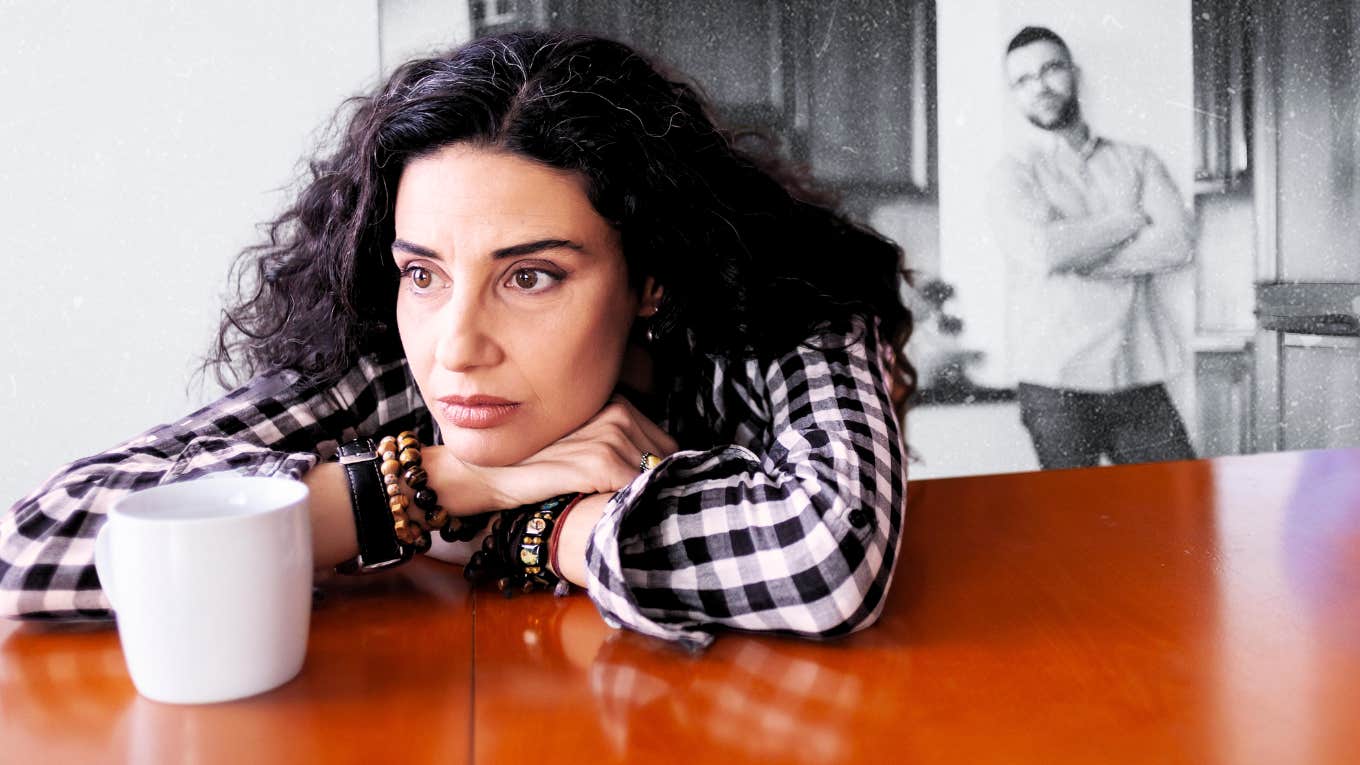My Invisible Illness Made Me Realize How Absent My Partner Was
Sometimes, we have to set others free, both for ourselves and for them.
 Vladimir Vladimirov | Canva
Vladimir Vladimirov | Canva My invisible illness, which could have taken my life, crept up and pounced on me during a heavy-stress, high-loss year and inundated me in a tsunami of deluge and darkness that illuminated the absence of my partner.
In that year, I quit an overworked six-figure job to reclaim living, then lost:
my physical, mental, and emotional health through that raging ocean of illness
my ability to write
partial vision in one eye
Advertisementone of my core friends who left this earth when the heavens unexpectedly called her home
My core friends, four women plus one man, whom I will call Manly, dwindled as I chose to set Manly free, recognizing that he had been absent in my life.
My good man
Of my core people, Manly was physically closest to me. We lived six blocks apart. We met after he communicated with me about something I wrote, which I thought signified he valued what was in my mind and heart.
I explained, when we met face-to-face, that I was happy being single due to my personality, chiefly, and circumstances with my chronically ill sons. The men I had known previously had consistently shown me that my sons and their incurable illnesses would not be accommodated in their search for good living — regardless of what beautiful qualities they saw in me.
But Manly’s interest in my thoughts, life experiences, how I found positivism and joy in everything despite a history of abuse and trauma, parenting my sons on my own, giving them opportunities I lacked, and recognition of my remembrance of him and his family, drew me to him. I felt accepted, desirable, and safe.
 LightField Studios / Shutterstock
LightField Studios / Shutterstock
Illness, waiting, and despair
Manly remains important to me, but it took my illness to help me accept that we could only work when I was functioning in my prime. I never anticipated what would happen to us if I became ill long-term.
As a woman who lives with the anticipatory grief of my sons' as-yet incurable, progressive illness, Cystic Fibrosis (CF), their needs are consistently present and could worsen at any time.
When I'm healthy, I can handle all my needs. But when the roaring, ravaging spate of hyperthyroidism suddenly drowned me, robbing me of all my strength, energy, and ability to breathe, sleep, walk, regulate my emotions, and think clearly, Manly did not support me in the ways I communicated that needed.
Over the five months that it took to achieve drug-induced control of my illness, including disease-induced depression, I invited Manly four times to talk so that I could share what I needed and how he could help me. I avoided distractions, carefully planned what I needed to say, and adapted to Manly’s communication style, which he appreciated. These conversations became vital because I increasingly understood that Manly did not realize how much I was suffering; plus, he constantly said, “Tell me what you need.”
Manly understood physical needs and would willingly supply them if I explicitly asked. He understood prescription pick up and picked up my medicines twice in those five raging months. He regularly offered or surprised me with my favorite foods and took me home after work a few times when I walked over to meet him at the hospital where he worked, and once, he picked me up at work after a late day. He took me to the hospital for the first of three emergency visits I needed.
But I waited five months for Manly to change three living room light bulbs that blew at the onset of my illness, and eventually climbed a ladder to replace them myself when I was well enough. While ten-minute walks became hour-long during those five NYC winter months when I wintered, too, in my body, only once did Manly offer to take me to work — when temperatures hovered around 17 degrees, and seeing me hesitate, he said, “Come on. Get in the truck. I’m cold.”
Early on, Manly offered to take me home every day after work, which I thanked him for. However, I refused because the thought of waiting at work for an extra two hours for his hospital shift to end felt like another drowning tsunami. I was already waiting for wellness, for my depressive, debilitating, drowning nightmare to be over, and for Manly to radiate rays of recognition of what I was going through.
My primary needs were emotional ones, not physical
My primary needs during the raging, dark tsunami of illness were emotional ones. Manly never saw that. “It was my mistake,” he said after we broke up, “I was trying to meet your physical needs; I didn't know the emotional needs were greater.”
But I did tell him repeatedly. He asked but didn't hear my answers, and he refused to try to understand or meet my expressed needs. If Manly understood, he quickly forgot, so I would have to explain and re-explain again. It drove me insane.
Illness-induced depression left me weeping and wailing— for my grown sons mostly, for the shame and guilt over my floundering performance at work, for fear that my 130+ BPM heart rate would never stabilize, and for despair over my inability to write coherent, words that I could publish. But it was the confusion I endured answering the same questions from Manly and hearing the repeated acknowledgments of not knowing that made me feel like I was losing my mind:
“How are you feeling today? What is your heart rate? Did you take your medicine? Do you have food? Want me to bring you…? Are you sure you don’t want soup? What time do you get out of work? Are you coming over? Should I come over? I didn't know that was a symptom of hyperthyroidism. Is it? I don’t know all the symptoms of hyperthyroidism. Why didn’t you tell me? What? Is he coughing up blood? I did not know that was a symptom of Cystic Fibrosis.”
I told him that I could not repeat the same things every day as it increased my frustration and compounded my illness. Manly wanted to defer our fourth planned conversation, scheduled for his living room couch one Saturday afternoon, with an episode of my favorite comfort show, Little House on the Prairie.
When I redirected and asked for what I considered to be simple things — show interest, ask me about my writing and social justice advocacy work, which were also suffering, remember the critical things I communicated (which did not include food), and give me at least brief feedback when I communicated — Manly said, “I’m not doing that. That’s not my love language.”
During our post-breakup conversation, again seated on his couch, I told him, “That day — that moment — when you said, ‘I’m not doing that. That’s not my love language,’ I could have gotten up and left, but I gave you and us the benefit of the doubt. Still, I sat on the couch and talked, asking questions and trying to find ways to help us both understand, even through the intensity of pain, loneliness, and abandonment that I felt.”
My illness and I upset the relational balance
Weeks before our breakup, Manly said, “I don’t know what else to do. I did not change.” He was right. He did not change. But I did, and because of that, I upset the relational balance we had.
My illness magnified how much I cannot exist on physical food alone, regardless of how delectable it is, and how much I might experience pleasure or togetherness over a shared meal.
I need the nutrition of deep conversation that stimulates critical thinking and nakedly bears the soul. I need the oxygen, bonding, and uplifting of empathetic companionship. I need someone to hold space with me in silence when no words are available or will suffice, and remembercritical experiences that I share.
Empathetic companionship is the realm in which I live and pour myself out daily. When the tsunamis of life come at me, and I feel bashed and battered, empathetic companionship helps me ride the waves.
Looking forward, I chose to be alone to fight whatever battles I found myself in rather than confusedly long for my most intimate partner to remember me and be present and understanding of me when he could not.
I refused to do that to Manly one more day. I refused to do that to myself. I was seduced by Manly and his acceptance of me and his easy way of requiring nothing from me. But I didn't know that requiring nothing from me because I am naturally giving also meant I required nothing from him.
But Manly did require something. He required that I remain unchanged.
 DimaBerlin / Shutterstock
DimaBerlin / Shutterstock
I am not angry with Manly. There is no disappointment or blame — only a path forward. With the high likelihood that my sons and I will suffer severe illness again, I chose to set Manly free rather than put him in the path of another tsunami that is mine alone to learn to surf. When I next saw Manly in our neighborhood, I was genuinely happy to see him smiling, relating with others, and doing well.
We do not often think of it when we are young, but as we age, it is more critical to consider the depth of our relationships and the support we might need during challenging times. Relationships thrive with mutual understanding and support. In intimate relationships, this mutuality is even more critical so that we know we can depend on each other in the long term — not necessarily by doing, but through understanding.
Effective communication in expressing one’s needs is just as vital as having the ability to recognize when a partner may not be capable of providing necessary support. Having a broader network of people who might be able to provide the type of support one needs is a crucial consideration, and we may need to stretch ourselves to develop these relationships. Self-awareness and prioritizing one’s well-being are essential, especially in adversity.
Relationships are complex, and changed personal circumstances can upset those dynamics. We should be willing to show up, be present, and make adaptations for our loved ones when the tsunamis of life hit. Sometimes, letting go and setting others free is as much for you as it is for them. How beautiful it is when that separation is not shrouded in anger and resentment but bathed in love.
For
Michelle Ann Patrovani, Ed.D., is a writer, educator, former school leader, and mom to two phenomenal young men with Cystic Fibrosis (CF), whom she considers her greatest gifts and teachers in life. Her articles have been featured in the NYAPE Journal, Cystic Fibrosis Foundation Blog, LinkedIn, and various Medium publications, including Invisible Illness and Thirty Over Fifty.
